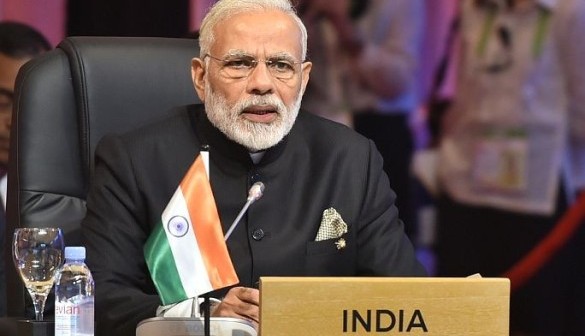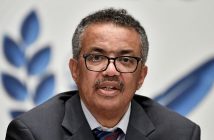Prime Minister Modi’s bold move into unchartered territories has changed the economic and strategic narrative for India on the global stage, writes India Inc. Founder & CEO Manoj Ladwa.
Sometimes, you can almost see the narrative turning. Close on the heels of India vaulting into the top 100 on the World Bank’s Ease of Doing Business rankings comes news that global credit rating agency Moody’s has upgraded India’s sovereign rating.
Both these are thumping global approvals for the Narendra Modi government and its handling of the economy. It was Modi’s bold political instinct that led to the launch of demonetisation and the Goods and Services Tax (GST) within eight months of each other, both decisions fraught with risk and together representing a massive political gamble.
Simultaneously, he has embarked on uncharted waters in the realm of foreign policy, but we will return to this in a bit.
The last quarter – which brought in its wake several pieces of disappointing economic news, including that of a fall in the GDP growth rate to a three-year low of 5.7 per cent – was probably the worst, at least from the perspective of media commentaries, in Modi’s three-and-a-half-year rule.
The knives were immediately out for the Indian Prime Minister and his government. The habitual nay-sayers – you know who they are, so I won’t elaborate – rubbed their hands in glee and declared that the central government’s alleged mismanagement of the economy was coming home to roost and that Modi’s honeymoon with the electorate was over.
Then, as mentioned earlier, the narrative began to change once again – this time for the better. The World Bank released its Ease of Doing Business rankings, which showed India jumping an unprecedented 30 places to vault into the Top 100 for the first time. The Congress party, rather petulantly, called the ratings “fixed”, but I guess India’s principal Opposition party was merely doing what the people mandated it to do – oppose.
This morning brought even better news. Acknowledging what Modi, Indian Finance Minister Arun Jaitley and most unbiased economists have been saying all along, global ratings agency Moody’s gave the BJP-led NDA government’s handling of the economy a huge thumbs up by raising India’s sovereign rating – for the first time in 13 years. The previous ratings upgrade, incidentally, also happened under the BJP-led NDA regime of Atal Bihari Vajpayee.
I am sure you will agree with me that these upgrades are just reward for the hard work and long yards put in by Jaitley and his team, as well as several other ministers and their departments. You can’t turn an economy around in a day. It takes time and the results are just beginning to show.
I don’t know what the Indian Prime Minister’s rivals will now do, but suffice to say that when notoriously hard-to-please global agencies such as Moody’s publicly applauds the Modi government’s handling of the economy, the world – and more importantly the men and women in corner offices in New York, London, Singapore and other international business centres, who decide on investments and financial allocations – sit up and takes notice. That can only be a plus for the Indian economy.
Now, to return to the other area where the Indian Prime Minister has brought a refreshing change – foreign policy. From a please-all, offend-none policy based on ideology, the focus has now changed to pursuing a foreign policy that puts India’s geo-political, economic and strategic interests first without sacrificing the soft-touch, cooperative template of previous eras.
Two such initiatives are of immediate topical interest.
I am speaking of the two developments that have taken place back to back – the revival of the initiative to form a quadrilateral partnership between the US, Japan, Australia and India – and Prime Minister Modi’s unprecedented invitation to 10 heads of states or governments of the ASEAN countries to be chief guests at India’s 2018 Republic Day parade as part of his government’s Act East Policy.
This is the first time that so many world leaders – from Brunei, Cambodia, Indonesia, Laos, Malaysia, Myanmar, Philippines, Singapore, Thailand and Vietnam – will be attending the annual Indian show of its military might and cultural diversity.
The Ministry of External Affairs (MEA) has announced that India and the Association of South-East Asian Nations (ASEAN) are marking 25 years of dialogue partnership, 15 years of summit-level interaction, and five years of strategic partnership.
A wide range of activities has been planned, which will culminate in a summit with the theme of “Shared Values, Common Destiny”.
I think most unbiased observers will accept that the Modi government has brought about a paradigm shift in India’s foreign policy since coming to power in 2014. It went several steps beyond the Look East policy of previous governments by renaming it Act East and followed it up with a robust and dynamic action-oriented engagement with ASEAN and also with Japan and the rest of the Indo-Pacific.
The thinly disguised and officially denied goal: create a balance of power with an increasingly aggressive and expansionist China, which has claimed, without any basis in international law, sovereignty over all of South China Sea, as well as dominance in the Indian Ocean Region.
Among ASEAN countries, Vietnam and Singapore have long been urging India to play a more assertive role in the region even as four of the 10 ASEAN members – Vietnam, Brunei, Malaysia and the Philippines – are directly affected by China’s unsubstantiated claims over their territorial waters.
It is in this context that New Delhi has upgraded its relationship with ASEAN to a strategic partnership and has, in recent years, sought to deepen its defence and strategic relationship with Vietnam.
 But the emergence of a new strategic bloc in the region is still only a tantalising possibility – yet to take concrete form – notwithstanding the cautious enthusiasm of all its backers.
But the emergence of a new strategic bloc in the region is still only a tantalising possibility – yet to take concrete form – notwithstanding the cautious enthusiasm of all its backers.
As I briefly mentioned earlier, the emerging quadrilateral partnership between the four large democracies in the newly minted Indo-Pacific can become a force for good in the region.
A recent meeting of the four countries in Manila is, perhaps, the first baby step in what may, or may not, be formalised into a proper grouping. A long and uncertain road lies ahead. But that’s for the future. For now, it is enough to note that a beginning has been made, even if the prospects of this group remain shrouded in uncertainty.
The good news on the economy and these fresh initiatives on the foreign policy front come after a brief spell, or rather one poor quarter, when only bad news seemed to be coming out of India.
What is it that binds these apparently unrelated news items into one comprehensive narrative? My answer to that is simple: honest hard work always pays off in the long run – even if one encounters a few potholes on the way.







